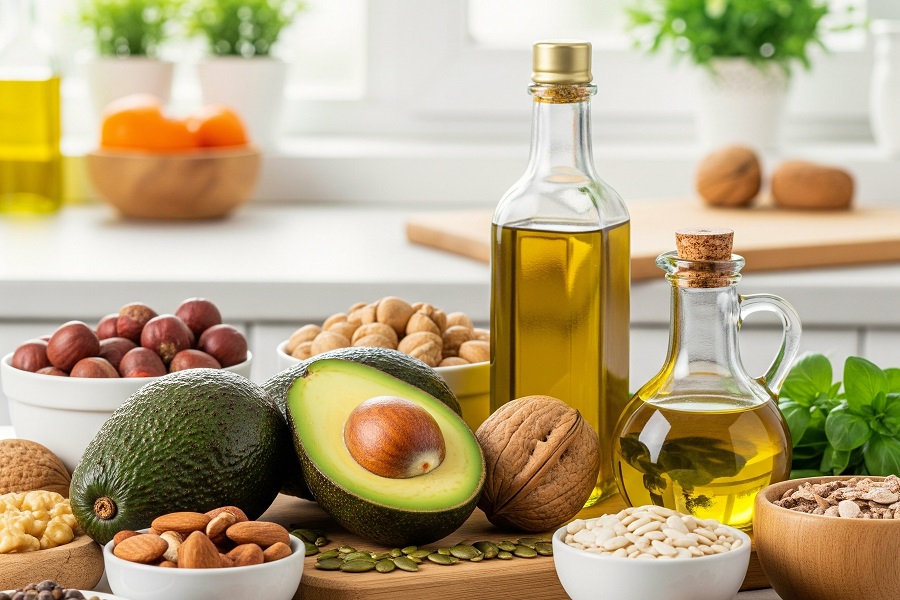Hong Kong researchers say certain dietary fatty acids may “supercharge” the human immune system’s ability to fight cancer.
They discovered that oleic acid, an omega-9 fatty acid found in olive oil and nuts, boosted immune γδ-T cells in cancer patients undergoing γδ-T cell therapy. These cells are known for their cancer-fighting properties.
Conversely, they found that another fatty acid, called palmitic acid, commonly found in vegetable fats like palm oil and fatty meats, weakens the ability of these immune cells to attack tumors. Oleic acid may help prevent this from happening.
“Our research suggests that dietary fatty acid supplementation, particularly with foods rich in oleic acid, such as olive oil and avocados, could enhance γδ-T cell immunosurveillance, leading to more effective cancer treatments,” says lead author professor Tu Wenwei from the Department of Paediatrics and Adolescent Medicine, School of Clinical Medicine, University of Hong Kong (HKUMed).
“The results indicate that cancer patients should avoid palmitic acid and consider oleic acid supplementation in their diets to improve clinical outcomes of γδ-T cell-based cancer therapies,” says Tu.
Fatty acids for fighting cancer
Dietary fatty acids are important for health, growth, and body functions. However, to date, the scientific understanding of how they affect cancer has been limited due to the complexity of people’s diets.
“This study is the first to show that the fatty acids we eat can directly affect how well our immune cells fight cancer,” notes Tu.
Specifically, the study identifies oleic acid’s benefits as stemming from a specific process involving a protein called IFNγ. Metabolomics analyses of blood samples from cancer patients confirmed that the levels of these fatty acids are linked to the outcome of cancer immunotherapy.
.jpeg) Researchers advise eating more foods rich in oleic acid (such as olive oil, avocados, and nuts) and cutting back on palmitic acid (found in processed foods, palm oil, and fatty meats).The researchers explain that palmitic acid stimulated cells to secrete excessive IFNγ, which induces cell death and results in reduced antitumor activity. Oleic acid, meanwhile, reduces the secretion of this protein and thus restores cells’ antitumor activity.
Researchers advise eating more foods rich in oleic acid (such as olive oil, avocados, and nuts) and cutting back on palmitic acid (found in processed foods, palm oil, and fatty meats).The researchers explain that palmitic acid stimulated cells to secrete excessive IFNγ, which induces cell death and results in reduced antitumor activity. Oleic acid, meanwhile, reduces the secretion of this protein and thus restores cells’ antitumor activity.
Immune δ-T cells are good at attacking tumors and have helped some lung and liver cancer patients live longer once activated.
However, this therapy is not effective for all cancer patients, partly because of variations in metabolism, which can influence its efficacy. The study authors call for follow-up research, in a larger cohort, to address gaps and make their findings more applicable.
Simple changes go a long way
For cancer patients, Tu believes this discovery supports the idea that simple changes could improve the effectiveness of cancer treatments.
Small lifestyle interventions may include eating more foods rich in oleic acid (such as olive oil, avocados, and nuts) and cutting back on palmitic acid (found in processed foods, palm oil, and fatty meats).
“The study also points to novel strategies, like combining dietary changes with specific drugs to further boost the immune system,” adds Tu.
The findings suggest that new drugs developed to target processes affected by these fatty acids may someday enhance the power of γδ-T cell therapies.
Ultimately, the researchers advocate integrating nutritional interventions with immunotherapy.
The team at the LKS Faculty of Medicine of the University of Hong Kong (HKUMed) published their findings in the journal Signal Transduction and Targeted Therapy.
Among other cancer research, researchers identified 27 species — among the hundreds of bacteria and fungi in the oral microbiome — collectively linked to a “3.5 times greater risk of developing pancreatic cancer.”
Meanwhile, a separate paper found that microplastics can change the human gut microbiome, which causes patterns linked to colorectal cancer.

